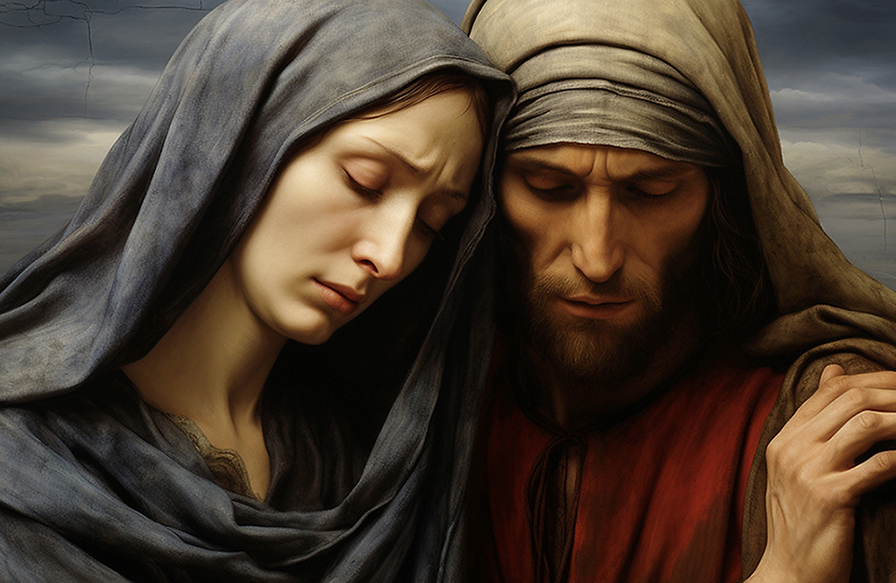Last Words: A Lenten Meditation on the Final Sayings of Christ, Week 4Sample

The Family of Faith Begins at the Foot of the Cross

Mother Mary and Saint John, Barbara Jean Alger. An illustration from the book entitled Imagine the Passion.
“Beneath the Cross of Jesus” from the album Closer. Composed by Elizabeth Cecilia Douglas Clephane and Julian Keith Getty OBE. Performed by The ZOE Group.
Poetry:
“Seafarers”
by Olugbenga Adeoba
The refrain of this water
says something is imminent,
says loss is upon us.
Bordered by kelp—
brown murals supple as wool—
and a cloud of winged witnesses,
our boat is somewhere
in the middle of the Mediterranean,
miles and miles from the coast
near Tobruk in Libya,
where we had camped
until the smugglers and the sea
spoke of its fidelity.
It was a soft, fluid tune:
the tender draw of water—
the sea, keen, humming
a promise of calm,
urging us to draw closer,
to unlearn all we thought we knew
about the posture of water.
There are dismembered boat parts,
whole dinghies, too,
shooting out from somewhere
beneath this expanse,
yielding us to catalogs
of told and untold mishaps;
the sea's unfulfilled promises
to those who had knocked on its door,
those who sought to know its ways:
the Nigerian boy
comforting his sister,
after they lost their mother
miles away from Sabratha,
and those with whom
we had camped at the coast,
the ones who drowned overnight
some hundred miles
south of the island of Lampedusa.
What binds us,
in this boat, is a known fear,
a kinship of likely loss,
the understanding that we, too,
could become a band of unnamed migrants
found floating on the face of the sea.
THE FAMILY FORMED AT THE FOOT OF THE CROSS
Mary doesn’t join the family of faith because of her blood connection to Jesus, or because she nursed him and raised him. Mary joins the way all of us do, by standing at the foot of the cross, keeping vigil over the death of the Messiah, turning her tear-stained face toward his agony. She is there by faith.
The right family for Mary would be the one who shared her sense of deep grief over the loss of her son. No glib replacement would do—no attempt to cheer her with some cheap distraction. Her new family must hold a place for her enormous sorrow and carry it together, knowing the sharp pain of separation and yet clinging to the delicious ache of having loved and having been loved by the Messiah. Theirs is “a kinship of (likely) loss.”
The new family of faith is formed through shared trauma. They had entrusted their futures to this Jesus, allowed themselves to hope wildly that he would heal the fractures of the world and make all things new. Instead, they watched in agony as his own life ebbed away, his blood running down his tortured body and dripping to the cursed earth.
Fears known and unknown loom large in this scene, like the specter of dismembered boats at sea, haunting the passengers of flimsy raft. Even so, in Jesus’ moment of anguish, he finds his mother and his devoted friend John and commends them to each other. He blesses a new bond. One son relinquished and one gained in a shuddering moment.
A loss as shattering as this drives you to find others who understand, who have been broken by what breaks you. Mary doesn’t seek distraction. She lingers here at the cross with John looking her son full in the face until the end. Her devotion draws her and will not let her go. So does his. They are the beginning of something new, though they don’t yet understand it to be so. They will gather with all their tear-stained friends waiting for whatever’s next.
Do they realize that they are what’s next? The family forged through suffering is being “built together for a dwelling place of God in the Spirit” (Eph. 2:22). The profound catastrophe of the cross thrusts them together to cling to grief in the absence of hope. The joyous ending they imagined is capsized like a dinghy in stormy waters. Everything depended on this. They had no plan B. Would they make it to shore?
Unsure, they cling to each other, discovering that “beneath the cross of Jesus, his family is my own.” Bound together with dashed hopes, they wait.
Prayer:
Lord, we have not always recognized what you were doing, connecting us to each other and helping us to become a new family. Thank you for the gift of others who have thrown in their lot with you. May we learn to live like the new family we are.
Amen.
Dr. Carmen Joy Imes
Associate Professor of Old Testament
Talbot School of Theology
Biola University
About this Plan

The Lent Project is an initiative of Biola University's Center for Christianity, Culture and the Arts. Each daily devotion includes a portion of Scripture, a devotional, a prayer, a work of visual art or a video, a piece of music, and a poem plus brief commentaries on the artworks and artists. The Seven Last Words of Christ refers to the seven short phrases uttered by Jesus on the cross, as gathered from the four Christian gospels. This devotional project connects word, image, voice and song into daily meditations on these words.
More
We would like to thank Biola University for providing this plan. For more information, please visit: https://ccca.biola.edu/lent/2025
Related Plans

Removing the Mask: Finding Freedom in Christ

Rest in the Wrestle

More Than Conquerors: 10 Days in Romans 8

Romans

7 Days to Fall in Love With Jesus – Jean-Luc Trachsel

Music, Movies & God - Film + Faith

Be Fruitful

Gospel-Based Conversations to Have With Your Preteen

Bible Stories to Deepen Your Friendships
